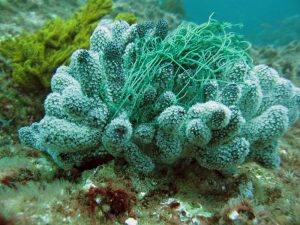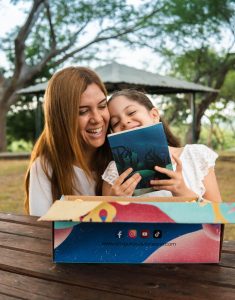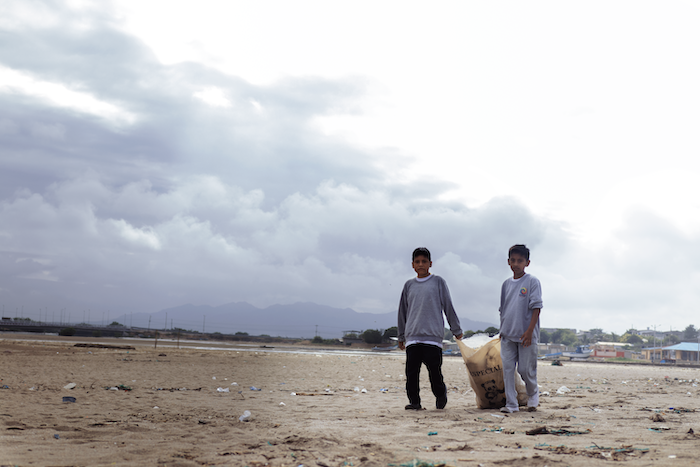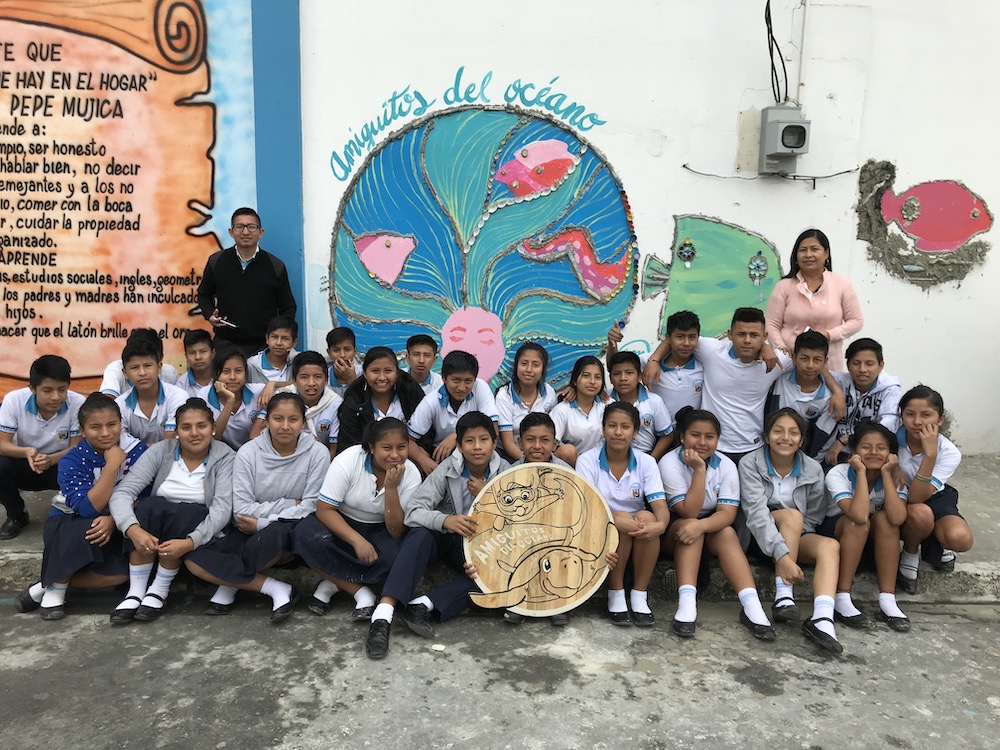Ayangue, Ecuador Becomes Second BlueCommunities Location In Ecuador
Think of biodiversity in Ecuador, and you are likely to make a mental hop straight to the Galapagos Archipelago, world renowned for its natural splendor, and for being a cradle for the genius of Charles Darwin’s evolutionary theory.
Continentally, however, Ecuador is home to a vast range of ecosystems which teem with endemic life forms, and which, like so many coastal systems across the globe, are under threat from oceanic pollution.

Coral with fishing net stuck.
Because the focus of international conservation efforts in the region tend to spotlight the smaller islands, rather than the continental landmass, there has historically been a lack in efforts to educate communities on the preservation of ecosystems. Now, however, Ecuadorian non-profit Amiguitos del Océano, is joining the expanding network of organisations hoping to counter this issue as part of Plastic Oceans International’s BlueCommunities initiative.
Founded in 2017 by biologist Daniela Hill – founder of Sea Life Diving – Amiguitos del Oceano has built their work up from the radically undervalued notion that progressive change for the future begins with the education of children. They work with children along the coast in rural areas to educate communities about the impact of plastic on the seabed, and to facilitate a permanent change in habits.

Daniela Hill and daughter exploring the Ocean Education kit.
Much of the most effective activism begins with a conversation, so Amiguitos del Océano’s genesis began with a conversation with the children at the school of Hill’s daughter. The aim of these conversations was to provide education to classes of young children on the impact of plastic in the oceans, and the threat to marine life posed by the ever-increasing pollution of our waterways. Hill was amazed, however, to find that she was being approached thereafter by parents who had no idea what was happening in the water a stone’s throw from their homes.
“It was at that point that I realised that if you engage children in topics that interest them, then it produces an intra-family conversation,” says Hill. “These conversations have a ripple effect: such a small intervention can cause such a profound change in the children’s perception of nature, and from there you can start to encourage changes of habit.”
Recognising the need to manifest this momentum in other places, Hill shifted her focus to education. Rounds of knocking on doors to garner support for her idea gradually grew into a project, with the constant vision of expanding into a foundation which could invest time and money in the education of the communities in which it worked.
And so Amiguitos del Océano was born, working in Guayaquil, Samborondon, Machala, and Milagro, amongst other coastal communities, to educate children through workshops, citizen science projects, and volunteer projects.
A critical component of any child’s experience working with Amiguitos del Océano is the beach cleanup which follows the workshops and talks. As anyone who has ever spent hours clawing in the sand for disintegrating polystyrene can testify, the firsthand experience of battling with the sheer profusion of rubbish which washes up from the ocean is one which leaves its mark.

Children participate in a beach cleanup.
“The reality of the beach cleanup really shakes people,” said Hill. “They find it unbelievable that there can be so much rubbish on the beaches, and they see so many of the products they use every day that they recognise in the waste they collect. “So it’s really a transformative experience, because it makes you reconsider everything that you use in your day-to-day life; it becomes a sort of personal metamorphosis in terms of personal habits and actions.”
It is a gift to be able to connect people to the ocean in such a tangible way, and it is one which Hill has harnessed to make a noticeable impact on the communities in which Amiguitos del Oceano work.
“Whereas many places around the world have already lost their ecosystems and have nothing left to protect, in Latin America all is not lost yet and many unique ecosystems remain, but are under threat,” says Mark Minneboo, Regional Director of Latin America for Plastic Oceans. “Organizations like Amiguitos del Océano in Ecuador work hard to educate local people and teach them about the value and interconnectedness with the natural environment. The result is that these same people, who are the ones who benefit the most from local ecosystems, become its guardians and help to protect and restore them.

Members of Amiguitos del Océano.
Indeed, in recent years, organisations in Latin America have become the unexpected trailblazers for innovating progressive, holistic environmental solutions which work to empower communities for the future. Amiguitos del Océano is discernibly running at the forefront of this movement, working with children – the denizens of the global future – to erase the disconnect between communities and their knowledge of the world’s waterways.
“We are a kind of window into the ocean,” Hill concludes, “a little piece of the sea in the classroom.”
Shannon Collins is lead environmental writer at Ninth Wave Global and covers the environment and southern Mexico for Mexico News Daily. She also writes feature pieces for a variety of international media platforms.

Trackback: buôn bán trẻ em
Trackback: rtp slot altogel
Trackback: chat rooms
Trackback: Caishen Wins
Trackback: บอลต่อ บอลรอง ตัวเลือกการ แทงบอล ที่ไม่ควรพลาด
Trackback: Engineering Technicians
Trackback: visit
Trackback: https://pomocdrogowazielonka.pl/2025/03/02/unlocking-success-with-pocket-option-bot/